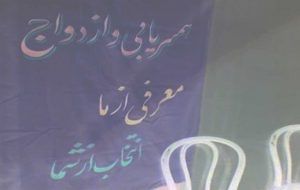October 12, 2016
There have been many discussions in recent years over the growing number of internet matchmaking services in Iran and their possible negative impact on society.
Those in favor of these websites believe it helps single men, who have been unsuccessful  on their own to find suitable wives. Those against them, are adamant that they promote temporary marriages (Sigheh) and prostitution, and are a fast, easy, and inexpensive way to find sex partners. They claim that such websites are disproportionately frequented by married men looking for extramarital affairs.
on their own to find suitable wives. Those against them, are adamant that they promote temporary marriages (Sigheh) and prostitution, and are a fast, easy, and inexpensive way to find sex partners. They claim that such websites are disproportionately frequented by married men looking for extramarital affairs.
Speaking to the Iranian Students News Agency (ISNA), Hamed Bakhshi, a sociologist, said: “The majority of those subscribing to these websites in Iran are married.”
Bakhshi pointed out that mostly married men are actively seeking these encounters, and that women are also cognizant of the nature of these relationships. Bakhshi describes it as a business transaction where women offer sex for money and men pay for the service. And in that context, the relationships are not prone to emotional engagement.
Married men searching for liaisons
Speaking to Kayhan-London, Dr Mostafa Eqlima, the head of the Academic Association of Social Workers, said that most single men in Iran do not have the financial means to sign up to online matchmaking websites in order to find a wife. He added: “ Ninety percent of men using these services are married, and that they start an affair but leave the woman after a while.”
Having taken part in a meeting at the Ministry of Youth Affairs and Sports to discuss this social phenomenon, Dr. Eqlima said: “A couple of other people and I were against issuing operating permits to these websites, reasoning that they would promote temporary marriages, and would be used by married men to find girlfriends. But the meeting ended without reaching any concrete results.”
The first of these websites went online in Iran in March 2013. Coincidentally, Mehr News  Agency reported that matchmaking websites had been legalized. Quoting Mohammad Baqer Pishnamazi, the deputy culture minister for youth and sport, Mehr wrote: “Real persons can also apply for permits to start online matchmaking websites.”
Agency reported that matchmaking websites had been legalized. Quoting Mohammad Baqer Pishnamazi, the deputy culture minister for youth and sport, Mehr wrote: “Real persons can also apply for permits to start online matchmaking websites.”
Even Telegram Messenger launched a channel dedicated to temporary marriages. There are currently ten Telegram channels offering this service with over ten thousand subscribers.
According to some regulatory bodies, there are currently somewhere between 700 to 1000 online matchmaking services in operation. Government sources have been able to identify 350 websites and twenty Telegram channels.
Reporting on one of these Telegram channels, Tabnak News Agency wrote: “ A man looking for a temporary marriage can easily find a suitable wife on this website, because women have been profiled according to geography, age and the amount of their dowry. Although people from all over the country have signed up for this channel, the website only matches men seeking temporary marriages with women from Tehran, Karaj, Mashhad, Shiraz and Yazd. This, apparently, is meant to protect the women. For a face-to-face meeting, the man, and not the woman, has to travel to one of the designated cities. In an online letter, the director of the channel assures its subscribers that the services offered by the website are in line with Islamic principles and values. Citing Articles 1034, 1071, 1077 of the Civil Laws and Article 21 of Family Protection Law enacted in 2011, he insists that the activities of the website are entirely lawful.”
Over 60 percent of men over 40 are unfaithful
According to Dr Eqlima, there are a number of matchmaking websites in the city of Qom that operate off the grid and without license. Apparently, Majlis (Parliament) hasn’t passed any laws in this regard. Dr Eqlima adds: “ Women who take part in temporary marriages are often ostracized by their families and are branded as widows or prostitutes. These websites provide opportunities for people to make money rather than help single men find wives. Iranian men rarely look for wives by going online, more likely they meet their partner through family, friends, or work. Iranians can depend on strong family support and a community culture, as opposed to western societies where people are more isolated.”
Dr Eqlima continued: “Our office deals mostly with married women whose husbands have been having extramarital affairs. We advise them to be patient. Most often those relationships are short-lived and the husbands eventually leave the women and return home. Unfortunately, it is a form of recreation for married men in Iran who chase not only single girls but also married women.”
Dr Eqlima points out that the liaisons boost the ego and self confidence of men over 40 who have reached the middle age, and fear not being attractive to women anymore. He adds: “As the men get older they may also become more successful financially and seek affairs with women of different ages. Iranian women would not tolerate this. Once a woman discovers her husband’s infidelity, the marriage deteriorates into a hostile and acrimonious relationship, ultimately ending in divorce.”
Highlighting the results of a survey carried by his department throughout the country, Dr Eqlima said: “۶۰ percent of men over 40 have been unfaithful to their wives at least once, and only 10-15 percent have been loyal to their spouse.”
Repeatedly, the authorities in Iran claimed that matchmaking websites and Telegram channels did not have the license to operate online in the country. But in June 2015, a government-approved matchmaking website was launched to encourage young people to get married.
In final analysis, internet match-making websites which ostensibly aim to promote marriage and family values, have, in practice, only encouraged infidelity and temporary marriages.
[responsivevoice_button voice=”US English Female” buttontext=”Listen to this “]








